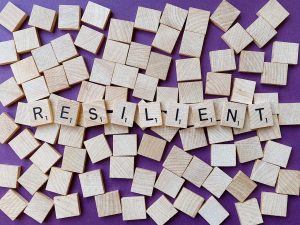
Grit and Resilience For Writers
At nine I decided to learn to swim and it was a good test for my grit and resilience. There was no swimming pool nearby and the only option was the local river. Fed from mountain springs it was ice cold, dark and murky. This did not deter me or my friends. Nor did insect bites or even a dead sheep which had fallen in and drowned up stream and floated by lifeless as we practiced our strokes.
By the end of the summer I had abandoned my flotation device and could swim from one side to the other. I now consider a cold shower a real challenge so perhaps some of my childhood resilience has left me but whenever I find writing difficult, I remind myself of my introduction to swimming and my first lesson in grit and resilience.
Being resilient gives us the ability to stick with things that are important to us through hell and high water, through thick and thin and for writers through thousands of words over hundreds of pages. Rejection from agents and publishers, negative reviews, slow sales, or self-doubt are issues every writer will face. In my view resilience is not a trait that people have or do not have. It involves behaviours, thoughts and actions that can be practiced by anyone.
Emerging scientific research has begun to show that that neurobiological systems associated with resilience can be strengthened to respond better to stress. For example, research using ECG and FRMI technology has shown that mindfulness and training in cognitive reappraisal can increase activation of the pre-frontal cortex. People with greater development of this recover more rapidly from negative emotions such as anger, disgust, and fear.
Angela Duckworth’s research has shown that with anyone striving to succeed the secret to outstanding achievement is not talent but a special blend of persistent and passion she calls grit. S he gives a first- hand account of her research in teachers working in some of the toughest schools, cadets struggling with their course at Westpoint and young finalists in the National spelling bee. She also interviewed dozens of high achievers. Many of us, it seems quit what we start far too early and far too often.
he gives a first- hand account of her research in teachers working in some of the toughest schools, cadets struggling with their course at Westpoint and young finalists in the National spelling bee. She also interviewed dozens of high achievers. Many of us, it seems quit what we start far too early and far too often.
She identified some key components of developing grit:
We must develop a great passion for something. You are working on something that you care about so much that you are willing to stay loyal to it. Imbuing everything you do with significance.
We need to develop tolerance of the mundane-the tediousness of daily practice.
A connection to a like-minded community helps, surrounded by people working towards their dreams.
There is also a willingness to encounter failure. Through practice we learn what we are currently unable to do. As toddlers we can do this but as grow older, we begin to think of failure as bad and associate it with shame.
While birth and circumstance play a role in grit, each of grits ingredients can be cultivated.
Teaching people to think of stimuli in different ways when the initial response is negative, or in a less emotional way when the initial response is “emotionally charged” changes how they experience and react to the stimulus.
It can help as a writer to make a list of the key values that your writing delivers. Does it inspire people? Is it entertaining? Why is this purpose important to you? Why is it important for other people?
Once you understand your sense of purpose, your ability to face, process and overcome rejection rises exponentially. In the face of the greater value delivered the obstacles raised by rejection are put in perspective.
More information on Angela Duckworth’s research can be found below:
https://www.ted.com/talks/angela_lee_duckworth_grit_the_power_of_passion_and_perseverance

